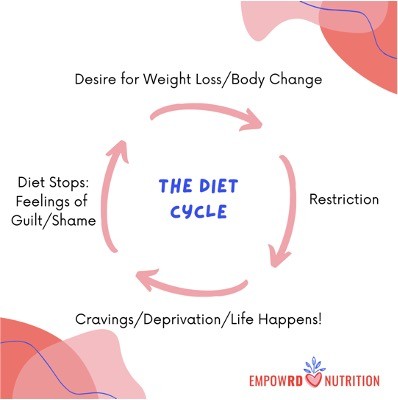Written by: Sarah Ortiz, RD, LD
Have you ever felt pressure to lose weight or go on a diet in the name of “health”? Especially in the new year? Additionally, have you ever tried a diet or plan and eventually fell off and chalked it up to lack of will-power or motivation? If so, you are not alone.
Around this time of year is when a lot of New Year’s Resolutions surrounding health and wellness might begin to go awry. Today’s topic aims to help you see that you are not alone in feeling the effects of the cycle of dieting, why this cycle occurs, and how it might impact our health.
What is the diet cycle?
I imagine most of us in today’s society have felt a desire, or even a pressure, to lose weight and/or change our bodies at least one point in our lives. When we feel this desire, often times the first urge is to begin a diet of some sort. In the beginning, following the rules of a diet may be easy, or even fun! However, eventually we start to feel deprived of whatever the chosen diet is restricting, and cravings may arise. We may also begin to feel burnt out with the rigidity of following the diet’s strict rules and, honestly, may even start to feel bored with it. At some point, we feel the lack of flexibility that diets offer and eventually “give in” or “break the rules” of the diet. This may breed feelings of guilt, shame, disappointment, or failure. These negative feelings often lead to the desire to lose weight and/or change the body, and the cycle begins again. See how this cycle can continue over and over again?!
Have you ever felt stuck in the traps of this cycle, hoping and pleading that the next time will be different? As a non-diet Registered Dietitian, I often spend time explaining and processing that it is not you who failed the diet, rather that the diet(s) have failed you. This is sometimes a foreign thought… After all, we live in a society that is constantly promoting the next fad diet while praising weight loss efforts and shaming us for the inability to follow restrictive eating and exercise rules. However, when we look at the science behind dieting, our eyes can be opened to see how they truly just do. not. work.
Why Diets Don’t Work
Our body is made up of powerful and strong systems that have one single goal of keeping us alive. When we begin a diet that restricts our energy intake, our body does not know the difference between restricting to lose weight and restricting due to famine or starvation! Our bodies are incredibly smart in that they will continue to work in ways to keep our organs functioning optimally with this perceived threat of starvation. This means that the body will adapt in ways such as slowing down metabolism, shifting energy focus to major organs and away from digestion (hello constipation when we are under-fueled!), and so on.
Impacts of Dieting
How do we define the success of a diet? The most common way diets define “success” is through weight loss. Although it is common to lose weight while following a diet, several studies have shown that the majority of dieters end up regaining the weight that was lost, and sometimes gain even more1,2. Losing weight and re-gaining it is often referred to as weight-cycling, and has been associated with higher risk for things such as3…
- Mortality
- Inflammation
- Muscle loss
- High blood pressure
- Disrupted metabolic function
- Emotional distress
And to top it all off, have you ever wondered if weight loss diets ACTUALLY improve health? A 2013 study reviewed 21 randomized control trial studies with at least a 2 year follow up period and examined long-term health outcomes such as blood pressure, fasting blood glucose, and lipid levels. It was concluded that there was no clear relationship between weight loss and the improved health outcomes. Essentially what this means is that there is limited evidence that weight loss improves health, rather, health promoting behaviors may improve overall health4.
Now What?
If you’ve made it this far you may be wondering, well now what? If dieting doesn’t work and can actually increase my risk for adverse health effects, how can I improve my health? Great question! Working with a weight-inclusive healthcare team (which can include a Registered Dietitian) to break the diet cycle and focus on implementing health-promoting behaviors may be a great place to start.
References:
- https://pubmed.ncbi.nlm.nih.gov/17469900/
- https://nutritionj.biomedcentral.com/articles/10.1186/1475-2891-10-9
- https://www.ncbi.nlm.nih.gov/pmc/articles/PMC4132299/#B20)
- https://seven-health.com/wp-content/uploads/2020/02/Tomiyama-et-al.-2013-SPPC.pdf
